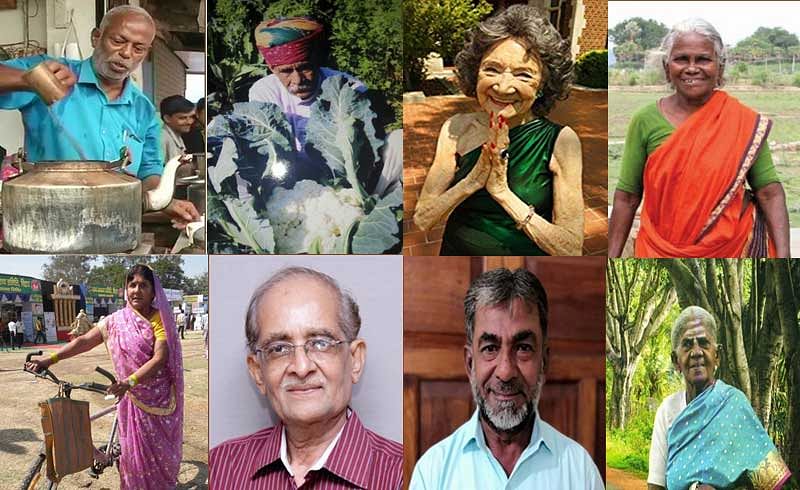A 106-year-old 'Vriksha Mata' from Karnataka, a 100-year-old 'Ageless Yogini' in the United States, a 96-year-old organic farmer who introduced carrots in Gujarat and an 84-year-old doctor who treats patients for Rs five -- 26 such 'unsung heroes' are part of the 113 Padma Shri winners.
The list is not just of centurions, nonagenarians or octogenarians as it also recognises the contributions of a 55-year-old artiste reviving Rogan painting in Kutch, 51-year-old epidemiologist who developed a cost-effective anti-rabies vaccine and a doctor couple working in Maoist-infested Bairagad where they treat patients for Rs 1 or 2.
Saalumarada Thimmakka, the 106-year-old who hails from Karnataka's Tumkur, is described by the government as 'Vriksha Mata' (Mother of Trees) who has planted thousands of trees in past 66 years.
One who has faced the brunt of society for her inability to bear children, Thimmakka has travelled 8,000 km per month to attend environment.
If she is the oldest among the Padma winners, American national Tap Porchon-Lynch at 100 years was chosen for spreading yoga abroad. The "Ageless Yogini", the world's oldest yoga teacher who has undergone three hip replacement surgeries, had taken up ballroom dancing at the age of 88 years.
Another winner is 96-year-old Vallabhbhai Vasrambhai Marvaniya, who introduced carrots to Gujarat in 1943. Practising organic farming for the past 65 years, he is a developer of 'Madhuvan Gajar', a variety of carrot.
At the age of 84, Shyama Prasad Mukherjee, the "Poor Man's Doctor", still does not rest and serves patients charging them a fee of Rs five and often treating many poor for free. The latest Padma winner, Mukherjee has been treating persons for past 50 years and examines 40 patients a day.
An organic farmer for 48 years, Jagdish Prasad Parikh was chosen for the Padma award for developing pest and climate resistant cauliflower that could be grown thrice a year in arid Rajasthan. He has the distinction of growing a 25-kg cauliflower.
Anup Ranjan Pandey (53) was chosen for his pioneering work in Maoist-infested Bastar in Chhattisgarh for spreading the message of peace through music.
The founder of 'Bastar Band', a theatre group that bring together artists from local tribes and put together in two decades after collecting 110 rate Chhattisgarhi instruments, Pandey propagates the message -- 'Leave the gun, take the drums'. Another winner who works in a conflict zone is the doctor couple Smita and Ravindra Kolhe in Bairagad.
A former IPS officer Jyoti Kumar Sinha also finds his name in the illustrious list of Padma winners. Sinha was chosen for his efforts to improve the literacy rate of Musahar community, which has a literacy rate of 3%.
Omesh Bharti from Himachal Pradesh was chosen for developing a low-cost anti-rabies treatment, which is one-tenth of the prevailing cost. He has treated 20,000 patients and his research had led to the reduction of vaccines from Rs 35,000 to Rs 350 per patient.
For reviving the dying Kutchi art of Rogan painting, 55-year-old Abdul Gafoor Khatri was chosen for the award. He had created the 'Tree of Life' presented to former US president Barack Obama by Prime Minister Narendra Modi.
Two persons -- a Maharashtrian man and a German woman -- were selected for their work in protecting cows. From a family of butchers, Shabbir Sayyad takes care of 165 cows in drought-prone Marathwada and "neither sells milk nor sells cows for meat". He earns Rs 70,000 a year by selling cow dung.
Friederike Irina Bruning, who is fondly called Sudevi Mataji, looks after 1,200 cows in her shelter in Uttar Pradesh's Mathura for the past 23 years.
From Tamil Nadu, the winner is 66-year-old illiterate Madurai Chinna Pillai who spread community-based micro-finance scheme 50 years ago. Ladakh's 'Wonder Surgeon' Tsering Norboo, who conducted 500 surgeries per year for past 50 years, was chosen for treating patients in the difficult Himalayan terrain.
Other inspiring winners included the 'Seed Man' Babulal Dahiya, who is growing 1varieties of rice on two acres of land for their preservation and the 'Canal Man of Odisha' Daitari Naik, a tribal who single-handedly carved out a three-km-long canal to bring mountain stream to agriculture fields.
Another Odiya in the list is a tea-seller Devarapalli Prakash Rao, who is reverently called 'The Tea-Seller Guru', for providing education to slum children. He contributed half of his income generated from tea selling to setting up a school 'Asha O Ashwasana' in Cuttack.

